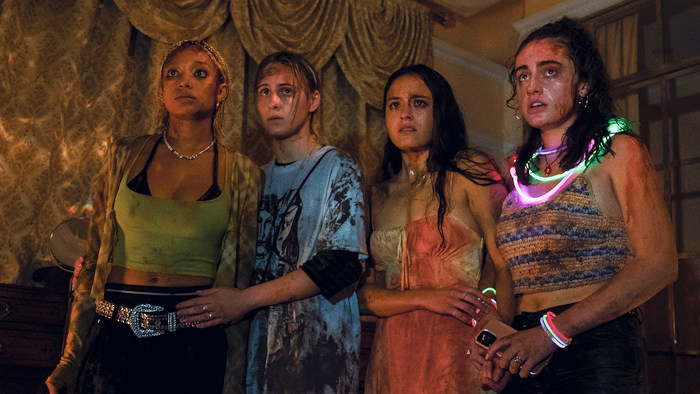Watching Bodies Bodies Bodies, I kept wondering whether I was in on the joke or if I was the joke. That’s the challenge of watching a movie about a younger generation, full of alien concerns and lingo. Like watching a foreign film full of cultural nuances and critiques, but instead of feeling the intrigue of a foreigner you just feel old.
Bodies Bodies Bodies leans on familiar genres. Ostensibly a country house mystery crossed with a slasher flick, the film subverts these genres with comedy. The audience is never expected to care about any of the characters or even be particularly intrigued by the mystery, which means the comedy props it up. Fortunately, the audience is not insulted with meaningless jokes trying to carry a bad genre flick (see my review of Tower Heist for an example of this). However, I cannot fully gauge the success of this effort because of the generation gap between myself and the characters. The film feels like an open mockery of Gen Z, but it may not be painting with broad strokes. All the characters but one are wealthy, so it might be much more targeted in its attack.

As a Millennial, I find Gen Z to be particularly confounding. When I taught English in grad school, the faculty lived in perpetual fear of Gen Z. Kids would often skip and nonchalantly excuse themselves as requiring “a mental health day.” Perplexed, we could never tell if these kids were serious. Did they truly believe that their mental health required a day off or were they challenging us to call their bluff? In our pursuit of ensuring that the younger generation feels “safe,” have we instead taught them to be brazen? One professor pointed out that the confidence required to talk so openly about mental health issues suggests that the students do not actually suffer from any extreme maladies.
The dialogue in Bodies Bodies Bodies argues that these twenty-somethings take their mental health days very seriously. Among the faculty, this was our greater fear. If the students were just lying to us as an easy way to skip class, that’s something we can understand. It’s annoying, but we can understand the psyche of a person doing it. We painted ourselves into a corner by erring on the side of caution and that’s something to figure out going forward. But if they genuinely believe they require a “mental health day” for a slight case of melancholy, now we have a situation that’s much more worrisome. Have we coddled these kids to the point of turning them insane in ways we never could have imagined?
That certainly appears to be the case in Bodies Bodies Bodies. We’re presented with a group of friends who all hate one another. They primarily communicate via a group chat and much of their verbal communication consists of discussing the mores of the group chat—you know, where real conversation occurs. It’s not immediately clear the the movie acts as a commentary on the digital lifestyles its characters and that’s a good thing. At first it just seems like accurate characterization. As we progress it becomes clear that dishonesty is the only mode of communication these kids know. Honesty is only used second hand as a weapon, when one character reveals the true feelings of another. Only when enough deaths have accumulated that honesty no longer poses a social threat do our characters viciously unleash it upon one another.
When a hurricane forces everyone inside with poor cell reception, the group plays a game called “Bodies Bodies Bodies,” the rules of which are murky and not really important. It’s sort of like a role-playing version of Clue. One girl complains that the game always leads to fights. “That’s what makes it fun,” quips David (Pete Davidson), the troll of the group. Predictably, their murder role-playing becomes reality. But with such a small group, it’s not long before we’re left with very few survivors, meaning very few suspects.
The premise by itself is the sort of story that has driven many horror movies. Bodies Bodies Bodies deviates from this template by never allowing the horror narrative to completely overtake the stories of its characters. As the bodies add up, the characters can never seem to let go of their personal dramas. The audience is left to ponder whether their reactions are abnormal or the expected response from a group so detached from reality.
There are several components that could be interpreted as metaphors. During the “Bodies Bodies Bodies” game the lights are turned out and they use the light from their cell phones to navigate the pitch black environment. The “hurricane party” functions as a convenient way to isolate our victims, but also reflects their attitudes: they seem to assume that their opulent mansion is immune to the worst nature can throw at them. Perhaps the best metaphor is when social media literally kills a character, but any more details would present a spoiler that would ruin the film.
The more I write about the film, the more convinced I become that I do get it, but a lingering doubt remains. Is the film actually making these commentaries about Gen Z or is it making fun of older generations for thinking these things about them? One thing I do know about Gen Z is that they have become masters of hiding in plain sight. As the first generation to grow up on social media, it always seems that they communicate in some code to undermine parental attempts to keep tabs on them. This is complicated by the fact that their humor largely consists of making us think they are doing this when they are not. So I worry about being the joke rather than being in on it.
I’m pretty sure I’m in on it. There are a few clues. First—and you can point to the intentional fallacy all you want—screenwriter Kristen Roupenian is a Millennial. That I had to look her up to confirm this speaks to how well she wrote the dialogue and crafted the characters. Second, the only sane character in the film is Greg (Lee Pace), who is either a young Gen Xer or an old Millennial. Notably, when David becomes aggressive and confrontational with Greg, he struggles to understand David’s intentions or meaning. They do not speak the same language and Greg cannot tell whether David is joking or serious, whether he’s being sarcastic or straightforward, whether he wants to initiate a physical fight or a verbal one. Faced with an irreconcilable communication breakdown, Greg goes to bed.
Bodies Bodies Bodies is an entertaining film that provides the audience with more than its genre would suggest. It does have some problems. The protagonist (Maria Bakalova) remains the greatest mystery throughout, making it difficult to have any emotional investment in her. The characters are annoying. It could have better invested in its supposed genre by trying to elicit real moments of fear. However, these complaints are minor. For the most part, the film accomplishes its goals and is well worth seeing.




